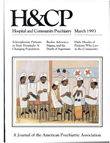From Research to Clinical Practice: Dissemination of New York State's Family Psychoeducation Project
Abstract
The New York Family Support Demonstration Project was begun in 1984 to translate the results of research on family psychoeducation in the treatment of schizophrenia into general practice. Goals were to compare experimentally a single-family psychoeducation model with a multiple-family group format, to replicate successful outcomes in ordinary clinical settings, and to train agency clinicians in the model. A total of 172 schizophrenic patients and their families from six sites across the state were followed for two years. Relapse rates comparable to those in more narrowly focused research studies were obtained in ordinary clinical settings. Patients in the multiple-family format had substantially lower risk of relapse than patients in single-family treatment. Over the next three years, the multiple-family approach was successfully disseminated across the state using a strategy based on five central assumptions of the psychoeducational model.
Access content
To read the fulltext, please use one of the options below to sign in or purchase access.- Personal login
- Institutional Login
- Sign in via OpenAthens
- Register for access
-
Please login/register if you wish to pair your device and check access availability.
Not a subscriber?
PsychiatryOnline subscription options offer access to the DSM-5 library, books, journals, CME, and patient resources. This all-in-one virtual library provides psychiatrists and mental health professionals with key resources for diagnosis, treatment, research, and professional development.
Need more help? PsychiatryOnline Customer Service may be reached by emailing [email protected] or by calling 800-368-5777 (in the U.S.) or 703-907-7322 (outside the U.S.).



